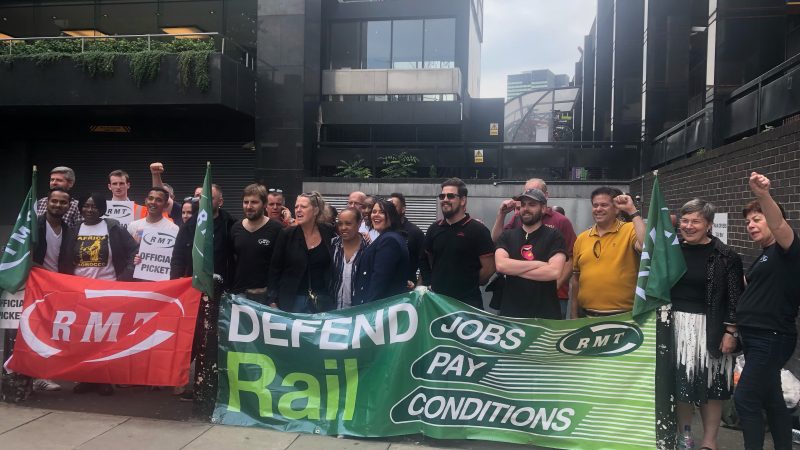
The general secretary of the RMT has, within the space of a week, become a television hero. It has happened in part because Mick Lynch is a no-nonsense, effective communicator. It is also because his sudden and prolific presence on our screens, as a representative of working people, is a novelty. Trade unions remain Britain’s largest democratic membership organisations, but their absence from regular print and broadcast media has become normalised. When union strikes are reported on, the story is seldom told from the point of view of the workers. The current RMT dispute highlights some of the reasons why.
Firstly, there is a lack of knowledge of what the trade union movement is, and does, among much of the media class – as indeed in wider society. While there once was a network of specialist journalists whose job it was to understand and report on trade union activity, the industrial brief is now almost non-existent. From the late eighties, following the defeat of the miners’ strike, newspapers instead began hiring business and consumer specialists. Stories from the boardrooms of the Square Mile replaced those of the industrial heartlands; business leaders and economists replaced worker representatives as talking heads on the news.
In 1989, trade union stories occupied 9% of all news space. Today, many disputes are lucky to make the local newspaper. Former Times industrial correspondent Christine Buckley also argued that cuts to specialist roles resulted in more stories about unions being either inaccurate or unfair – it might help explain why Labour’s former head of media Sian Jones tweeted this week about news producers who couldn’t tell the transport unions apart.
We are now confronted with an overwhelmingly consumerist angle to strike reporting. In Paul Manning’s Spinning for Labour, he argues that we are increasingly presented with a focus on our access to goods or services as opposed to wider societal or economic issues. So, stories about train strikes will detail the inconveniences of the travelling public, less so what the pay claim by rail workers is, or what the cuts to staffing mean to the industry. When lecturers walk out, we hear more about the student-as-customer experience than what an assault on pensions means for the future of academia.
Some in the media argue this reorientation was simply a response to a changing economy. As the service and finance sectors outgrew Britain’s manufacturing and other ‘blue-collar’ industries, there was a shift in the way in which industrial power was understood. Successive governments even encouraged this: an end to a conscious working class meant an end to an empowered trade union movement that threatened neoliberal projects. What’s more, the introduction of anti-union laws can be mapped alongside the demise of industrial journalism: as labour laws became more stringent, the union voice in the media less visible.
Media ownership also determines what we read and see. It is not in the interest of businesses to promote organisations that exist to wrestle power back from corporations (remember Wapping?). The focus away from workers toward the consumer is a much more convenient angle for capital. If the reader is agitated about their own personal inconvenience, they are less likely to think collectively: how their own material conditions might also benefit from similar struggles. Lynch has presented a counterweight to this: applying the demands of the RMT to the wider concerns of all workers amid a cost of living crisis. Hearing the workers’ side of the story undoubtedly garners a sympathetic response; the TUC reported online searches for ‘join a union’ rose by 184% since the RMT strike began.
Unions’ own agency is not to be underestimated though. Trade unions do not necessarily always invite mainstream coverage. Media historian Jean Seaton made a key assertion on this: that for the most crucial aspects of their work, unions don’t need the media. First and foremost, in a dispute, unions must speak to and win over their members; not the public. The RMT is undoubtedly very effective at this: it is part of why their strikes are so solid. In compelling members, unions have their methods and styles of communication which bypass mainstream media. Seaton says this ‘style’ of communication is not modified to meet ‘middle-class’ understandings of communication assumed by commentators. Think circulation of information on the shop floor, or the power of rhetoric when speeches are made before a show-of-hands vote: arenas for communication to which reporters are not privy, at least not nowadays. Or is that about to change?
It is certainly the case that the RMT’s Lynch has a particular panache, and Politico has written up a good ‘best bits’ summary of the week. Does this signify a shift in union-media relations? It is probably too soon to tell, though alternative media platforms may indicate a change in appetite: Novara recently advertised for a new industrial reporter. Unions are currently scoring victories all over the place, regardless of what does or does not make the news, but what the RMT strike shows us is that while much media infrastructure may be ill-equipped to tell our stories, unions will strive to do so on their own terms, with workers’ voices and concerns at the centre.
The RMT railway workers’ strike continues on Saturday 25th June. You can use StrikeMap to find your nearest picket line.




More from LabourList
MPs, union leaders and organisations react to ‘bruising’ Gorton and Denton result
A gory night for Labour
‘SEND reforms are a crucial test of the opportunity mission’